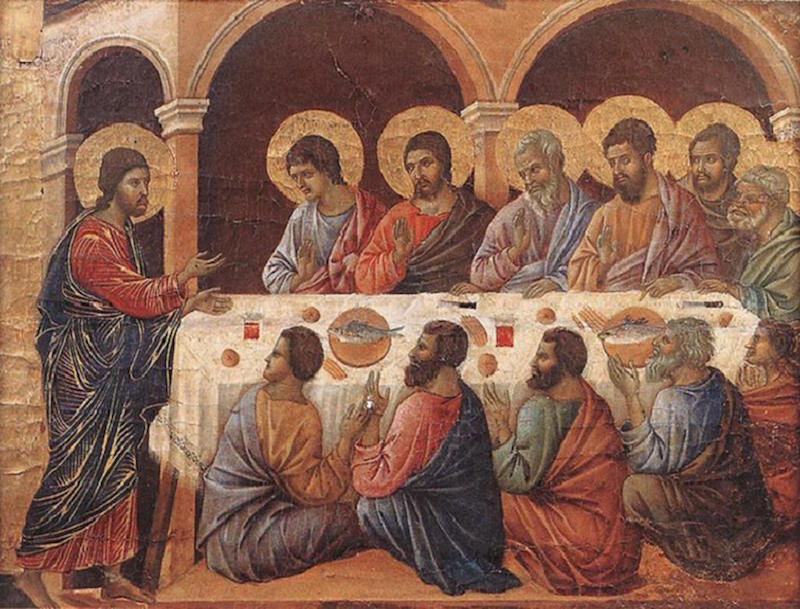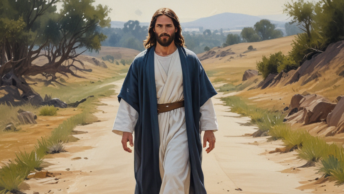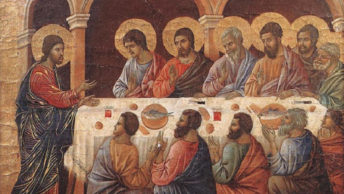The basic message contained in the readings for the Third Sunday in Ordinary Time is the universal call to discipleship. We say that this call is universal because God calls all people of all nations. And God’s call is always loving, patient and persistent.
An excellent example of God’s love, patience and persistence in calling one to discipleship is found in the Book of the Prophet Jonah (3:1-5, 10). In it we see that Jonah is being called by God to be a preacher. But Jonah is being called to preach, not to the people in his native land, but rather to do his preaching in a foreign land. And not just any foreign land, God is assigning Jonah to preach to the people of Nineveh, the capital of Assyria. And Jonah is not happy about this. Jonah has absolutely no desire to deliver God’s message to the people of Nineveh.
Just a little bit of history, at this point, might help us to understand why this assignment was so difficult for Jonah to accept.
Jonah lived in the northern Kingdom of Israel in the eighth century B.C., just after Israel was utterly destroyed by Assyria. The people who were not killed in the battle, and those who were not killed when the cities were burned, were tortured and scattered to the four winds. Only a few struggling survivors were left after this invasion and massacre. Jonah was one of those survivors. These survivors were now living in the midst of a ruined country, populated now by foreigners, who were imported by Assyria from other conquered lands. (Gold Label Publications January 2003)
Like every other Jew in Israel at that time, Jonah resented the presence of these foreigners. And for obvious reasons, he hated the Assyrians. It is at this point in history that God calls Jonah to preach to the people in Nineveh, the capital city of these hated Assyrians. To Jonah, this is utter madness. Not only were these people his hated enemy, they were not even Jewish. They were Gentiles. So Jonah goes down to the coastline and gets on a boat. But instead of going to Nineveh, Jonah sails in the opposite direction, to Tarshish. And I think we all know the familiar story that follows.
God creates a violent wind and turbulent seas. Everyone on the boat is in great fear for his or her life. They theorize that someone on board must have angered their God and, consequently, it is their God that must be causing them all this misfortune. So they cast lots to see who it is; and this singles out Jonah.
So they ask Jonah, “Who are you? Where are you from? And what have you done?”
And Jonah confesses, “Yes, it’s me. I worship the one true God, the God of heaven and earth, the God who made the sea and the dry land. And I am fleeing from my God. I am not going to where He has sent me.”
His fellow passengers then reply, “How could you do this to us? What shall we do with you, so that the sea may quiet down for us?”
Jonah replies, “Since it is because of me that this violent storm has come upon you, throw me out of the boat so that your life may be spared.”
So they throw Jonah out of the boat. A large fish then surfaces and swallows Jonah. The people on the boat are shocked. And they all cry out, “May the God of Jonah forgive us for taking this man’s life.” And instantly, everything becomes quiet. Everyone on board is struck with great fear of Jonah’s God. Then they all offer sacrifices and make vows to God.
For three days and three nights, Jonah lives in the belly of the fish. Then God commands the fish to spew Jonah out on the shore near Nineveh.
It is at this point that our first reading begins, just after Jonah is expelled from the fish. God tells Jonah, “Now go and do as I told you. Preach to the people of Nineveh.”
And Jonah thus becomes a reluctant preacher. But Jonah has the distinction of being the most successful prophet in the Hebrew Bible. He is also the most disappointed of all the Old Testament Prophets.
The message Jonah was given to preach was, “Repent! Repent, or in 40 days, God will destroy you and your nation because of your sinfulness.”
Jonah did not want them to repent. These were his enemies. He wanted to see them destroyed by God.
Now you have to visualize the scene. Can you imagine how Jonah must have looked and smelled, after living three days and three nights in the belly of a fish? Can you imagine the people? They would have seen this big fish swim to the shore and spew Jonah out on the beach. Then they would have seen Jonah pick himself up off of the shore and walk into town, looking like nothing they have ever seen before, all the while shouting, “Repent!” Can you imagine?
We are told that the city of Nineveh was very large. It was so large, that it took three days to walk through it. But Jonah’s preaching was so effective, that at the end of the first day, the entire city repented. Everyone put on sackcloth. They fasted. And they prayed.
Jonah became very disappointed by this. He said to God, “See, I told you so. This is why I didn’t want to come here in the first place. This is why I fled to Tarshish. I knew this would happen.”
Thus Jonah is recorded for all of history, as being one of the most successful of all preachers; and for being the most disappointed of all preachers. It was abhorrent to Jonah that a nation as wicked as Assyria should escape God’s wrath.
Jonah’s attitude may sound unbiblical, but I don’t think that we can criticize Jonah for his mentality. Most of us are no different. We all have our own Ninevites and Assyrians. Those people who make us uncomfortable; those who we see as being outside the circle of God’s love; those whose sins make us wish for their destruction.
If God called you or me to preach to such people, would we be willing to go? It is a very difficult lesson for most of us to learn, that God is not the enemy of our enemies.
Jonah is a very unhappy person throughout most of this story. He is unhappy to be called to preach to Nineveh in the first place. He is unhappy in the belly of the fish. He is unhappy when he finally does preach to the city. He is unhappy when the city repents. And he is unhappy when the city is spared from God’s wrath. In fact, the only time in this story that Jonah is happy, is when a plant gives him shade from the heat of the sun, as he sits on a hillside outside Nineveh, while he waits to hopefully watch God destroy the city.
But God has a greater vision for Jonah, and He has a greater vision for us. God wants us to learn that He loves our enemies just as much as He loves you and me. Fortunately for the Assyrians, God wanted to forgive them, so much so that He sent them a prophet to preach to them, to give them every chance to repent.
Notice that God wanted to forgive Jonah also. Just as God would not give up on the Assyrians, despite their evil, God would not give up on Jonah either, despite his narrow vision, stubbornness and anger.
In the end, the Ninevites repent. The entire population heard the message of Jonah and believed in God. This complete conversion of the entire city’s inhabitance truly reveals and demonstrates the stubbornness of Jonah. In fact, as the story ends, only one person is left unconverted, that is the prophet himself.
The book of Jonah ends with God attempting to invite the prophet into the circle of celebration. Like the parable of the prodigal son which ends with the father speaking with his older son outside the house, begging him to come inside and join in the celebration; so too, the story of Jonah ends without a clear resolution.
Did Jonah convert? Did he learn the lesson of universal love? Did he come down to the city to celebrate the grace of God that had come to all? Or did he remain on the hillside fuming, refusing the love of God, if it included people like the Assyrians?
I think it is interesting to note that in the Gospel of Mark (1:14-20), the message proclaimed by Jesus contains the same word, “Repent! Repent and believe in the Gospel.”
At first glance, the examples of the call to discipleship in the Gospel may appear to stand in stark contrast to our reading from the Book of the Prophet Jonah. As Jesus passed by Simon and Andrew, He simply said, “Come” and the men, immediately, abandoned everything to follow Jesus. Similarly, when Jesus saw James and John, He called them and, immediately, they too dropped everything and followed Him. There is no evidence of the reluctance that we saw with Jonah. Right now they appear eager and willing to follow Jesus.
But remember, these are the same men that fled from Jesus after He was arrested on the night before He was crucified. Yes, Peter did follow Jesus that night, at a distance; but he denied that he even knew who Christ was. As the people around the fire persisted in accusing Peter of being one of His followers, Peter curses and swears and says, “I am not one of his disciples.” So, just as Jonah was imperfect, but successful, so too were the disciples of Jesus imperfect, but also successful.
We too have been called to discipleship. We may feel totally unqualified and unworthy of such a call, but it is essential that we never forget our calling.
Saint Paul had formed a community of believers in Corinth. In his first Letter to the Corinthians (7:29-31), the people of Corinth were a troublesome lot with divided allegiances. Paul wrote to them, begging them to straighten out their priorities. Paul reminded them of their calling. Paul was convinced that the risen Lord was to return very soon. It was urgent that the people put first things first.
Paul was not against marriage. He was not against the ordinary business of everyday life. But Paul reminded the Corinthians not to get so wrapped up in the present, which is passing away, as to neglect the essentials, the things that are eternal.
What is permanent, what is eternal, what is never changing, is the love of God. This love was made manifest in the person of Jesus. We have all been called to be his disciples.
Yes we are imperfect. But so were Jonah, Simon, Andrew, James and John. In comparison, however, our assignment is much simpler. All we have to do is demonstrate the love of God to the people around us. To weep with those who are weeping, to rejoice with those who are rejoicing, to recognize that we are simply stewards of the things of this world, the things that God has entrusted to us.
As Paul said, “The world in its present form is passing away.” We all know this to be true, for nothing in this world is permanent. Everything changes over time. Love is the only eternal truth. And God is Love. We are to love one another. That is our mission. Let us pray, therefore, that, just like Jonah, we too may be successful in our mission.









Thank You Deacon… I’m not sure I ever knew the entire story of Jonah and the Whale… including the Aftermath. It makes more sense, and certainly demonstrates your point. It was nearly as effective as The Lord’s method of making his point. I said, “Nearly Deacon.”
Quite Sincerely,
Goulash… aka… Daniel M Matto